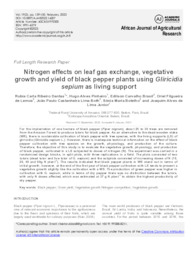Nitrogen effects on leaf gas exchange, vegetative growth and yield of black pepper plants using Gliricidia sepium as living support.
Nitrogen effects on leaf gas exchange, vegetative growth and yield of black pepper plants using Gliricidia sepium as living support.
Author(s): DANTAS, R. C. R.; PINHEIRO, H. A.; BRASIL, E. C.; LEMOS, O. F. de; BOTH, J. P. C. L.; ARAUJO, S. M. B.; LIMA JUNIOR, J. A. de
Summary: For the implantation of one hectare of black pepper (Piper nigrum), about 25 to 30 trees are removed from the Amazon Forest to produce tutors for black pepper. As an alternative to the dead wooden stake (WS), there is sustainable cultivation of black pepper with tree species, with the living supports (LS) of gliricídia (Gliricidia sepium L.). However, there is inadequate technical information on the effect of black pepper cultivation with tree species on the growth, physiology, and production of the culture. Therefore, the objective of this study is to evaluate the vegetative growth, physiology, and production of black pepper, cultivated in a LS subjected to doses of nitrogen (N). The experiment was carried in a randomized design blocks, in split plots, with three replications in a field. The plots consisted of two tutors (dead tutor and live tutor of G. sepium) and the subplots consisted of increasing doses of N (10, 20, 40 and 60g N plant-1). The results indicated that black pepper plants in WS stand out in terms of initial growth; however, at the end of the first year of black pepper cultivation with LS tends to present a vegetative growth slightly like the cultivation with a WS. The production of green pepper was higher in cultivation with G. sepium, while in terms of dry pepper there was no distinction between the tutors, with only N doses affected, which was estimated at 37 g N plant-1 to obtain the highest productivity of dry pepper.
Publication year: 2023
Types of publication: Journal article
Unit: Embrapa Eastern Amazon
Observation
Some of Embrapa's publications are published as ePub files. To read them, use or download one of the following free software options to your computer or mobile device. Android: Google Play Books; IOS: iBooks; Windows and Linux: Calibre.
Access other publications
Access the Agricultural Research Database (BDPA) to consult Embrapa's full library collection and records.
Visit Embrapa Bookstore to purchase books and other publications sold by Embrapa.

